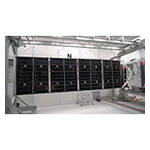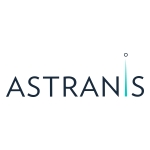
Astranis Space Technologies First MicroGEO Satellite Completes Final Testing and Is Ready for Launch
The satellite will be the first-ever dedicated satellite for the entire state of Alaska and will have an immediate impact on bridging the state’s digital divide when service begins later this year
SAN FRANCISCO–(BUSINESS WIRE)–Astranis Space Technologies Corp. today announced that the first MicroGEO satellite is ready for launch after successful completion of final testing.
Astranis has now completed all major tests necessary for its first MicroGEO spacecraft to be ready to ship to the launch site, including vibration and vibroacoustic tests, final solar array and antenna deployment tests, propulsion system tests, software tests, and electrical checkouts. This follows a successful thermal-vacuum, or TVAC, test campaign that was concluded late last year.
Vibration and vibroacoustic tests, collectively known as the vibe test campaign, are some of the most intense tests of structural and mechanical endurance for any spacecraft. During vibe, the vehicle was subjected to low-to-mid frequency mechanical vibrations and mid-to-high frequency acoustic vibrations simulating the extreme forces it must withstand during launch. Afterward, Astranis engineers performed a final series of software and hardware checks to ensure the payload is fully functional and the satellite remains mission-ready.
“Having passed this final sequence of tests, our first commercial satellite is now officially ready for launch,” said John Gedmark, CEO and co-founder, Astranis. “Passing these checks is always something to celebrate, but this time it’s especially meaningful because we’re building something new the world has never seen before and sending it to space for the very first time.”
When the satellite enters service later this year with capacity leased exclusively to Alaskan satellite middle-mile provider Pacific Dataport Inc. (PDI), it will have an immediate impact on bridging the state’s digital divide. The compact but powerful MicroGEO satellite is expected to triple the state’s currently available satellite bandwidth while providing true broadband speeds and reliability to consumers at roughly one-half the cost of existing services.
“Complete and ubiquitous coverage of Alaska has been our primary mission from the start and Astranis is helping us achieve that,” said Chuck Schumann, CEO, Pacific Dataport Inc. “Alaska is the largest state with the lowest population density so naturally we hear from people every day who live in very isolated places, telling us how hungry they are for fast, reliable broadband internet service. Imagine a village with few roads that is only accessible by a small airstrip. There are no cell towers, no cable, and no fiber. Affordable, reliable broadband is a generational change for a community like that and this satellite is going to help us bring this change for our entire state.”
Astranis MicroGEO satellites are 1/20 the size and cost of traditional GEO communications satellites. With a lower price tag and much shorter build times when compared to legacy satellites, Astranis provides dedicated satellite bandwidth as a service, allowing customers like PDI to connect people in places that have been overlooked, underserved, or priced-out of the market for fast, reliable broadband internet.
To learn more about how Astranis MicroGEO satellites can make affordable broadband internet a reality for unconnected people anywhere on the planet, visit Astranis.com.
About Pacific Dataport Inc.
Pacific Dataport Inc. (PDI) is a satellite middle mile provider headquartered in Anchorage, Alaska. PDI was founded to enable Internet access for everyone, everywhere in Alaska. PDI is focused on providing affordable middle mile and last mile broadband using the newest satellite technology from the Aurora Satellite Network. PDI clients include telecoms (wired & wireless), non-profits, hospitals, health clinics, schools, libraries, governments (Tribal, local, state & federal) and Alaska Native Corporations, Villages, and Tribes.
The Aurora Satellite Network is a combination of new geostationary high throughput satellites and low-earth orbit satellites. High throughput broadband satellites are the most cost-effective way to deliver broadband service to a large geographic area. Used in tandem with low-earth-orbit satellites enables a hybrid network with high data rates as well as low latency. Hybrid networks provide inherent back-up and redundant service for customers while keeping the cost as low as possible. With Alaska’s vast and treacherous landscape there are villages and communities that will never see terrestrial broadband solutions in our lifetime. PDI will serve any location in Alaska with broadband this year.
For more information on PDI please look to pacificdataport.com.
About Astranis
Astranis is building small, low-cost telecommunications satellites to connect the four billion people who currently do not have access to the internet. Each spacecraft operates from geostationary orbit (GEO) with a next-generation design of only 400 kg, utilizing a proprietary software-defined radio payload. This unique digital payload technology allows frequency and coverage flexibility, as well as maximum use of valuable spectrum. By owning and operating its satellites and offering them to customers as a turnkey solution, Astranis is able to provide bandwidth-as-a-service and unlock previously unreachable markets. This allows Astranis to launch small, dedicated satellites for small and medium-sized countries, Fortune 500 companies, existing satellite operators, and other customers.
Astranis has successfully launched a test satellite into orbit and is now underway with its first commercial program—a satellite to provide broadband internet for Alaska that will more than triple the available bandwidth across the state. This satellite is now in final assembly and set for a launch in 2022. The company is headquartered in San Francisco with a team of over 175, including world-class engineers from SpaceX, Boeing, Skybox, Qualcomm, Apple, and Google. Astranis has raised over $350 million from top Silicon Valley and growth investors, including Andreessen Horowitz, Venrock, and BlackRock.
For more information, follow along at Astranis.com or on Twitter at @astranis_space.
Contacts
Andrew Flick
aflick@astranis.com


